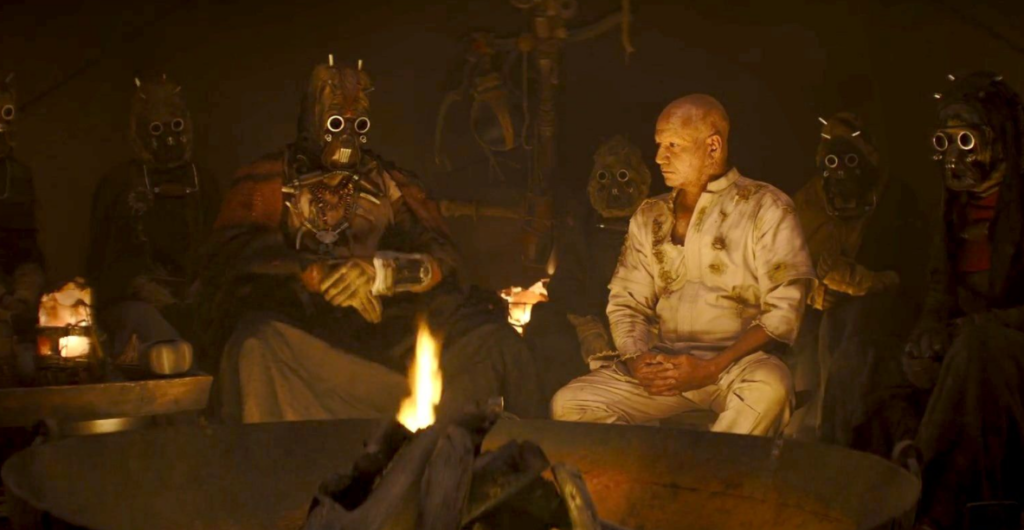This review contains spoilers for the Book of Boba. This review is written by a white-passing Star Wars fan, and is by no means an authentic indigenous perspective on fiction, but rather the impact of Star Wars on the mind of one that engages with post-colonial stories.

Temeura Morrison’s impact on Star Wars has come to greater attention as the series has entered the ownership of Disney. I remember listening to the actor wax excitedly about returning to Star Wars (this time as Boba Fett) in the Mandalorian series. The videos of him playfully striking a powerful Maori pose, bearing his tongue to the camera, and swinging a big stick leaves me eager to match his excitement. Whether you’re a fan or not of this era of Star Wars—it has certainly been exciting. There are more stories being told. And too be blunt, there are newer stories being told. The stories of women particularly stand out. But for the book of Boba, I am most excited by an indigenous story. While the first episode of the series was met with mixed fan-fair, with even my own reaction being neutral affirmation—the Maori warrior that resides beneath Boba’s costume—the actor filling it—has caught my fancy by bearing a torch to an often disregarded fictional group of indigenous folk– the Tuskens (also known as the “tusken raiders”). The inner critic is quick to point at examples of violence, savagery, and even slavery amongst this group. But I would #clapback by reminding my fellow viewer that Tuskens had neither been given screen time or language to explain the history behind it.
This new insight into one particular Tusken raider tribe that had taken on Boba Fett as a slave has been remarkable. I will not excuse violence or slavery, nor will I equate it to old cowboy movies—mostly because I don’t like too many old cowboy movies, despite my earnest attempts as watching the classics.
Tom Morrison, our Maori actor and Sci-Fi bounty-hunting criminal space-cowboy, has elevated the voice of Tuskens. Prop, costume, and make-up has brought the masked desert-dwelling “savages” of Star Wars a language. While Boba never grasps the intricacies of the mule-like gasping and wailing of the Tuskens, they do communicate. The language barrier is first crossed by relying on objects and movements, and by the second episode has evolved to a recognizable sign language.
The Tusken tribal leader explains that they are not one violent horde but many distinct tribes. Whereas the Tuskens in previous films seemed to go out of their way to attack the more “civilized” farmers, podracers, or criminals of Tatooine, these seem solely concerned with water. They utilize Boba at first for the sole purpose of collecting subsidence. They put him to work for the tribe’s survival.
After being temporarily freed from his binding to defeat a monster, Boba is reluctantly accepted with higher value. We are made to understand their plight as our protagonist communicates more, on-screen, with members of the tribe. They explain that “Offworlders” with “machines” come in many forms. In episode II of Boba this takes the form of a speedy train garrisoned with mercenaries armed with advanced weapons. The train passes through the tribe’s land while they search for water and shoot many in passing. It feels like a one-sided slaughter (somewhere between the train from Lawrence of Arabia and Kilgore’s beach assault in Apocalypse now). Boba asks for the tribe’s blessing in leaving, asking only for their weapons, with the promise of stopping the train. He steals a set of speeders (super fast hover bikes, “machines”) and shows them how to use them. The Tuskens are reluctant but feel emboldened, no longer on an entirely different playing field from those that have been shown exploiting their land.
Any feeling of white saviorism is misplaced—fictionally, this is Boba Fett, an orphan that is not accepted socially by many, aiding the Tuskens, a desert dwelling nomadic group often portrayed as malicious, simple savages with funny-looking spears. That is the fiction. The nonfiction: an actor embracing his indigenous heritage elevates the voice and arms of another indigenous group.
The action that follows is exciting but it is the ending that moved me. Boba Fett and his Tribe look over the captured mercenaries that once killed the Tribe without remorse (and perhaps still will). The mercenaries are silent, expecting to be killed out of revenge. The Tuskens and Boba spare them, declaring with authority that [this tribe lays ancestral claim on this land, and any future use of it will require a toll].
I recognize that for many viewers this may simply be a cool line or foreshadowing of a future conflict—it wouldn’t be Star Wars if it weren’t; but in the real-world where indigenous stories often go ignored, it is powerful logos.
Thanks for coming to my Fett Talk.